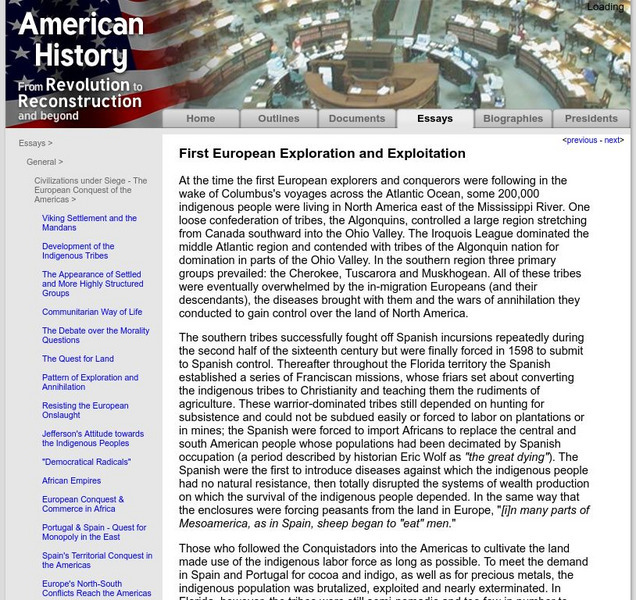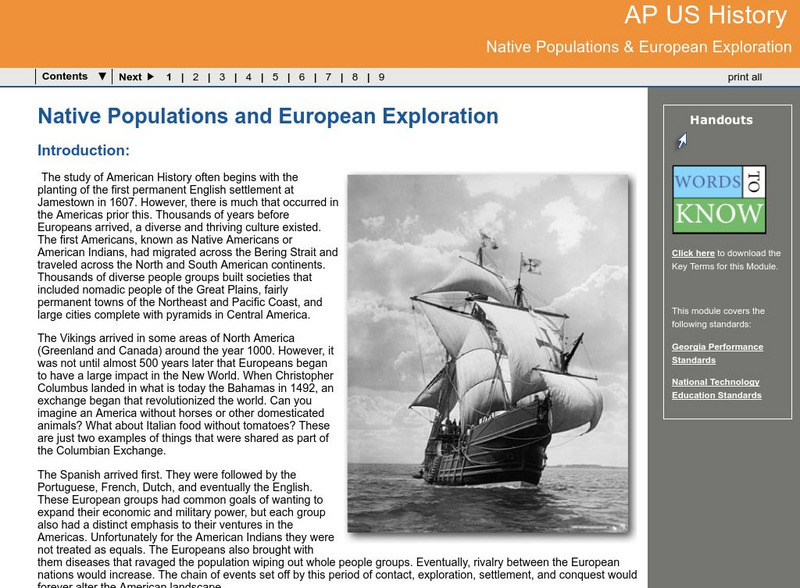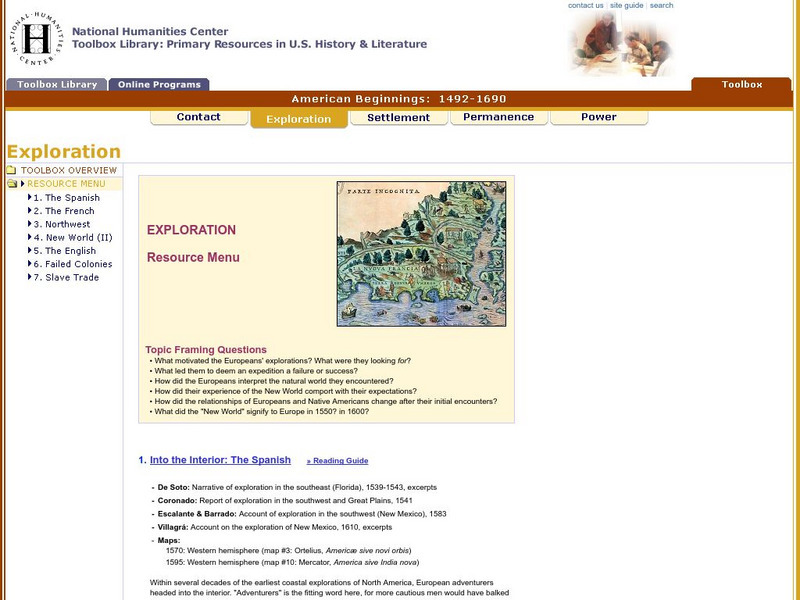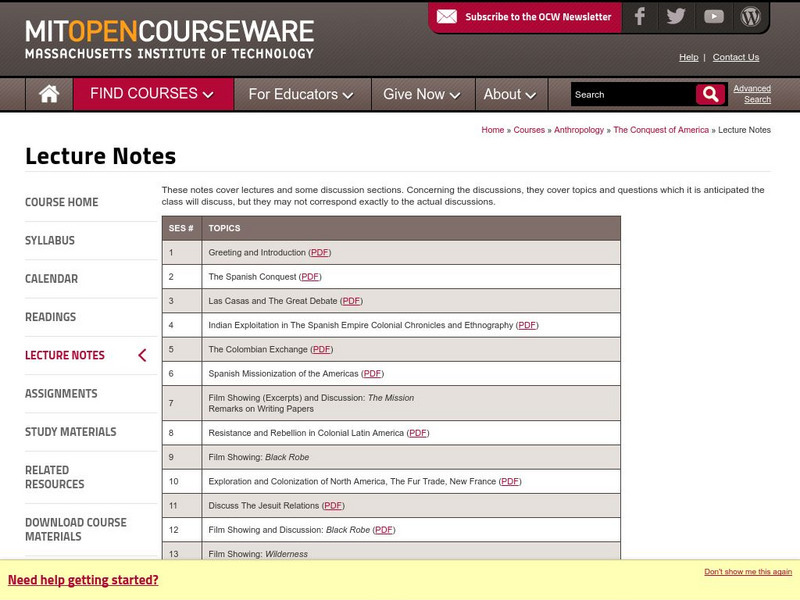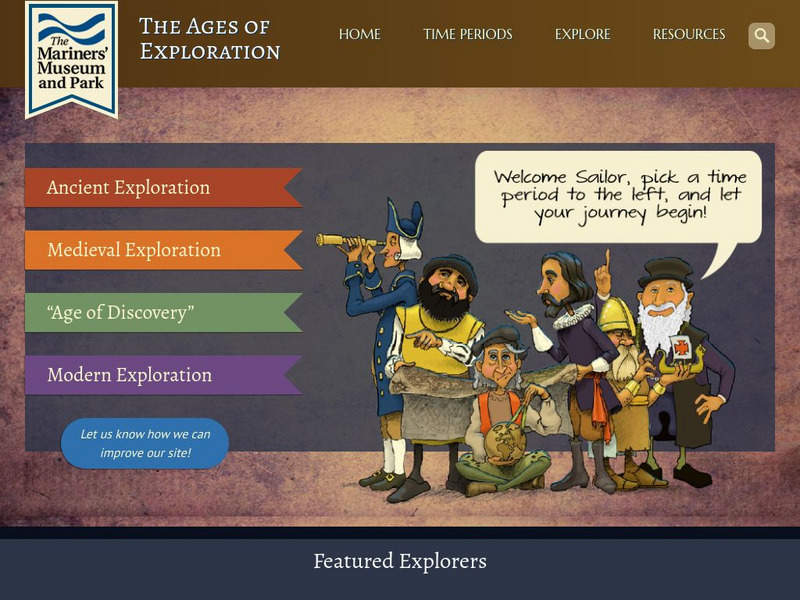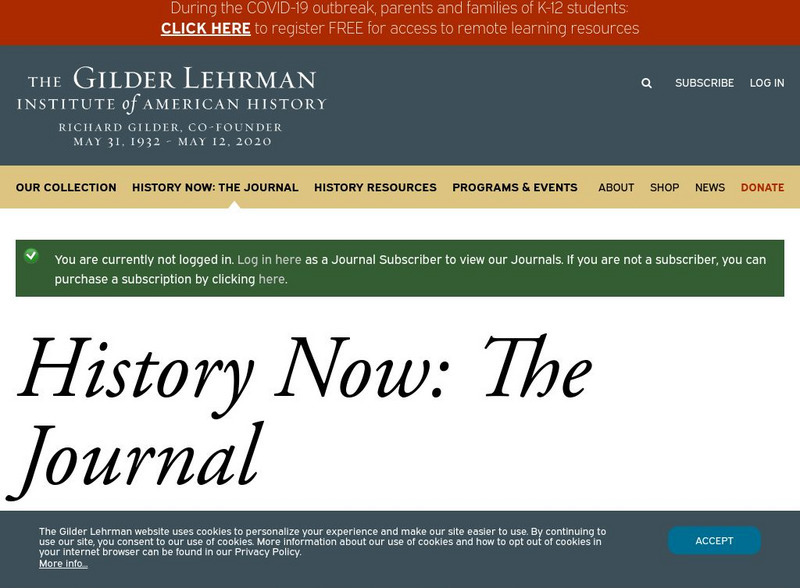Hi, what do you want to do?
Curated OER
Native American Dwellings Scavenger Hunt
For this social studies worksheet, students work on a project to find information about the dwellings of Native Americans for the seven questions while using the internet.
Curated OER
Maine
In this Maine reading comprehension worksheet, students read a 2-page selection regarding the state and they answer 10 true or false questions pertaining to the selection.
Curated OER
Colonial Williamsburg
Fifth graders study about Colonial Williamsburg and become "experts" in one aspect of that period. They will actively seek and share their knowledge via the internet.
Curated OER
French and Indian War
Fourth graders engage in activities that familiarize them with the causes of the French and Indian War. They discuss the problem that started the war, the countries involved, and the effects to come about as a result of the French and...
University of Groningen
American History: Essays: First European Exploration and Exploitation
Essay on the exploitation and decimation of indigenous peoples as a result of European exploration, settlement, and colonization in North and South America.
Texas Education Agency
Texas Gateway: Exploration and Colonization of America
Given short summaries about the reasons for European exploration and colonization of North America, students will compare English and Spanish settlements in the New World.
Khan Academy
Khan Academy: Us History: 1491 1607: European Exploration in the Americas
A quick comprehension check over European Exploration in the Americas.
University of California
Uc Santa Barbara: What Brought the Europeans to America?
Short essay addresses reasons that brought the Europeans to America. Covering many important points, he also provides compelling reasons and a map.
Texas State Historical Association
Texas State Historical Association: Early European Exploration and Development
A chronological timeline of early European exploration and development in Texas spanning from the sixteenth to the nineteenth centuries.
National Humanities Center
National Humanities Center: Toolbox Library: The European Presence in North America 1492 1690
Primary source material on European presence in North America between 1492 and 1690 covers the topics of contact, exploration, settlement, permanence, and power. Includes notes and discussion questions.
Georgia Department of Education
Ga Virtual Learning: Ap Us History: Native Populations & European Exploration
AP U.S. History learning module explores the encounter and interactions between European explorers and Native populations in America. Complete set of resources, interactive material, assignments and assessment.
OpenStax
Open Stax: Portuguese Exploration and Spanish Conquest
From a chapter on "Early Globalization: The Atlantic World, 1492-1650," this section describes the importance of Portuguese exploration of the Atlantic and Spanish exploration of the Americas.
Annenberg Foundation
Annenberg Learner: America's History in the Making: Mapping Initial Encounters
Columbus' arrival laid the basis for encounters between Europeans, Native Americans, and Africans. This unit examines how these contacts altered the way of life of peoples around the globe.
Texas State Historical Association
Texas State Historical Association: European Exploration [Pdf]
An activity guide where students refer to the Texas Almanac, which is free to download, for information needed to complete assigned tasks. For this lesson, students are asked to research Spanish and French explorers and create a 'living...
The Newberry Library
Newberry: Shakespeare's the Tempest and Utopias of the European Renaissance
Newberry Library learning module uses primary source material of Shakespeare in a lesson on how Renaissance writers and artists portrayed European exploration of America. Students read excerpts from works of Renaissance literature to...
National Humanities Center
National Humanities Center: Toolbox Library: Exploration, American Beginnings: 1492 1690
Thirty two primary sources-historical documents, literary texts, and visual images-that explore the expectations and the realities of European exploration of the New World.
Massachusetts Institute of Technology
Mit: Open Course Ware: The Conquest of America
Consider these resources while illustrating the natives' response to Europeans settling into the Americas.
Library of Congress
Loc: Discovery and Exploration
This American Memory site documents the discovery and exploration of the Americas with both manuscripts and published maps, many of which date from the European Age of Discovery. The site includes 22 map titles and descriptions, as well...
Mariners' Museum and Park
Mariners' Museum: The Ages of Exploration: Age of Discovery
This Age of Discovery page presents naval artifacts and explorers of the 15th century to the early 17th century. It looks at European explorers who journeyed to North and South America, the search for the Northwest Passage, and...
Mariners' Museum and Park
Age of Exploration: Changing View of the World: The Development of Map Making
Read a summary of the history of map-making and the maps that were produced as a result of European exploration in the Americas. See examples of these maps and find out more about each one in this exhibit from the Mariners' Museum.
Gilder Lehrman Institute of American History
Gilder Lehrman Institute: Age of Exploration
[Free Registration/Login Required] Learn about the exploration of the Americas. Site includes primary source documents, videos, essays, and lesson plans to help students research the exploration of the new land.
PBS
Pbs Learning Media: Primary Source Set: Exploration of the Americas
This collection uses primary sources to explain the early exploration of the Americas.
Wisconsin Historical Society
American Journeys: Eyewitness Accounts Early American Exploration/settlement
A collaborative project of the Wisconsin Historical Society and National History Day, this site contains over 18,000 pages of primary source, eyewitness accounts of North American exploration starting with the Vikings.
Library of Congress
Loc: Online Exhibition: The Cultures and History of the Americas
Examine some of the rare books, maps, prints and other artifacts in this online exhibition. The exhibition explores several themes on the cultures and history of the Americas. The collection focuses on the period of pre-contact through...









